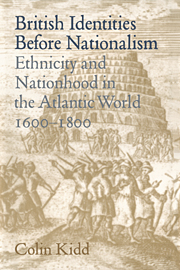3 - Ethnic theology and British identities
Published online by Cambridge University Press: 06 July 2009
Summary
The clerisies of the British Isles were keenly aware that questions of ethnic origin bore heavily not only upon national status and identity, but also upon the standing of Christian truth. As we saw in the last chapter British writers, such as James Ussher, the formidable Anglo-Irish chronologist, were actively involved in the great ethnological debates which enthralled the clerisies of early modern Europe. The same themes which preoccupied theologians on the Continent – the peopling of America, men before Adam and gentile chronology – were standard features of British theology throughout the seventeenth and eighteenth centuries.
Ethnic matters pertained by definition to the province of religion. The entry for ‘Ethnick’ in the Glossographia (1656) compiled by Thomas Blount (1618–79) ran as follows: ‘heathenish, ungodly, irreligious: And may be used substantively for a heathen or gentile’. A century later, Johnson's Dictionary (1755) defined ‘Ethnick’ in broadly similar fashion: ‘heathen; pagan; not Jewish; not Christian’. As we saw in chapter 2, the term ‘ethnic theology’ was in fact used in this era to refer to pagan religion; however, the scope of the discussion here will be somewhat broader. As well as engaging with the unfamiliar early modern construction of ethnic otherness, this chapter will also embrace our own rather different twentieth-century awareness of the ‘ethnic’.
Chronological foundations
The link between ethnicity – in its modern sense – and religion was deeper than an accidental semantic connection. Historiography was shaped by theology.
- Type
- Chapter
- Information
- British Identities before NationalismEthnicity and Nationhood in the Atlantic World, 1600–1800, pp. 34 - 72Publisher: Cambridge University PressPrint publication year: 1999
- 1
- Cited by



